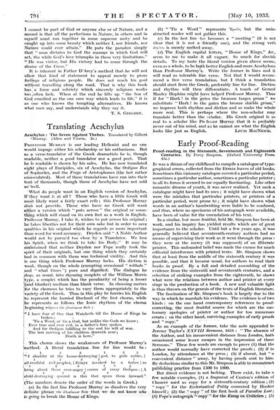Translating Aeschylus
Aeschylus : The Seven Against Thebes. Translated by Gilbert -4 Murray. (Allen and Unwin. 3s.) PROFESSOR MURRAY is our leading Hellenist and no one would impugn either his scholarship or his enthusiasm. But as a verse-translator of the Greek dramatists he is, though readable, neither a good translator nor a good poet. That he Is readable is shown by his sales. He has now translated eight plays of Euripides, six of Aeschylus, the Oedipus Rex of Sophocles, and the Frogs of Aristophanes. (the last rather ennisculated). Most of these translations have run into their tent of thousands, though those of Aeschylus have not sold -What do people want in an English version of Aeschylus,. if•they want it at all ? Those who have a little Greek will most likely want a fairly exact crib ; this Professor Murray d4 not provide. Those whO have no Greek will want either a version which "puts across" the original or some- thing which will stand on its own feet as a work in English. PrOfessor Murray, I take it, wishes to put across his original ; he-takes liberties not for their own sake but in order to save qualities in his original which he regards as more important than word for word accuracy. Dryden said " A Noble Author woilld not be pursu'd too close by a Translator. We lose his Spirit, when we think to take his Body." It may be Maintained that neither Dryden nor Pope really took the spirit of their originals, but one thing which they certainly had in common with them was technical virility. And this is one thing which Professor Murray lacks. His diction is weak, though on the whole (excepting occasional " withals " and "what times ") pure and dignified. The dialogue he 'idoes, as usual, into rhyming couplets of the William Morris type, a couplet which has the peculiarity of being a looser (and blanker) medium than blank verse. In choosing metres for the choruses he tries to vary them appropriately to the variety of the Greek. Thus in this play he hurries his English to represent the hurried Dochmii of the first chorus, while he represents as follows the Ionic rhythms of the chorus beginning stOpom ray LItAeo-fotKow Bedv : " I have fear of One that Watcheth till the House of Kings be
broken ; • • 'Tie a Word, or 'tis a God, but unlike the Gods we know ; • Ever true and ever evil, in a father's fury spoken And for Oedipus fulfilling to the end his will of woe. The last meeting of his children draweth near ; Death is hero."
:This chorus shows the weaknesses of Professor Murray's method. A literal translation line for line would be : 1 2 8 1 2 3
It I shudder at the house-destroying 1 god, to gods unlike, 1
. 1 2 3 2 1 all-truthful evil-prophet; 1 Erinys invoked by a father 1 to 1 2 3 1 3 2
bring about those over-angry curses of crazy Oedipus : 1 A i 2 3 4 !child-destroying quarrel is this that spurs them forward."_ (The numbers denote the order of the words in Greek.) - ' (a) In the first line Professor Murray so dissolves the very definite phrase .rli-CoXeolot-koy thris -that-we- do- not know- who -_ is going to break the House of Kings".
(b) " 'Tis a 'Word" represents 'Epen%p, but the unin- _ structed reader will not Other der
(c) In the last line --1in becomes a " meeting " (it is not clear that it is not a -friendly one), and the strong verb LrpOret is merely melted-away.
"(d) The .English capital letters, "House of Kings," &c., seem to me to make it all vaguer. So much for slavish details. To my taste the literal version given above seems, even as a whole, to be both better English and more Aesehylean than Professor Murray's. Write the former in lines and it will read as tolerable lice verse.. Not that I would recom- mend a free verse translation, but I think a translation should start from the Greek, preferably line for line. Diction and rhythm will then differentiate. A touch of Gerard Manley Hopkins might have helped Professor Murray. Thus if for " Hark ! in the gates the bronzen targes groan" we substitute " Hark ! in the gates the bronze shields groan," we improve both rhythm and diction and so make the whole more real. This is perhaps where the non-scholar may translate better than the Fcholar. His Greek original is so real to a scholar like -Pr fessor Murray that -it is probably never out of his mind, and so he cannot see what the Faiglish
looks


































































 Previous page
Previous page